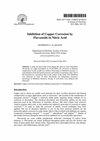Synthesis, Characterization, Biological Activity and DNA Binding Studies of Metal Complexes with 4-Aminoantipyrine Schiff Base Ligand
引用次数: 24
Abstract
A new series of transition metal complexes of Cu(II),Ni(II),Co(II), Zn(II) and VO(IV) have been synthesized from the Schiff base ligand (L) derived from 4-amino antipyrine and 5- bromo salicylaldehyde. The structural features of Schiff base and metal complexes were determined from their elemental analyses, thermogravimetric studies, magneticsusceptibility, molar conductivity, ESI-Mass, IR, UV-VIS, 1H NMR and ESR spectral studies. The data show that the complexes have composition of ML2 type. The UV-VIS, magnetic susceptibility and ESR spectral data suggest an octahedral geometry around the central metal ion. Biological screening of the complexes reveals that the Schiff base transition metal complexes show significant activity against microorganisms. Binding of Co(II) complex with calf thymus DNA (CT DNA) was studied by spectral methods.4-氨基安替比林席夫碱配体金属配合物的合成、表征、生物活性及DNA结合研究
以4-氨基安替吡林和5-溴水杨醛为原料合成了一系列新的过渡金属配合物Cu(II)、Ni(II)、Co(II)、Zn(II)和VO(IV)。通过元素分析、热重分析、磁化率、摩尔电导率、ESI-Mass、IR、UV-VIS、1H NMR和ESR光谱研究确定了希夫碱和金属配合物的结构特征。结果表明,该配合物的组成为ML2型。紫外可见性、磁化率和ESR光谱数据表明,在中心金属离子周围呈八面体结构。配合物的生物学筛选表明,希夫碱过渡金属配合物具有显著的抗微生物活性。用光谱法研究了Co(II)配合物与小牛胸腺DNA (CT DNA)的结合。
本文章由计算机程序翻译,如有差异,请以英文原文为准。
求助全文
约1分钟内获得全文
求助全文

 求助内容:
求助内容: 应助结果提醒方式:
应助结果提醒方式:


